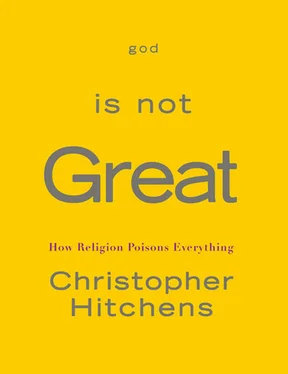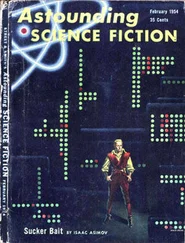And neither do we . The decay and collapse and discredit of god-worship does not begin at any dramatic moment, such as Nietzsche’s histrionic and self-contradictory pronouncement that god was dead. Nietzsche could no more have known this, or made the assumption that god had ever been alive, than a priest or witch doctor could ever declare that he knew god’s will. Rather, the end of god-worship discloses itself at the moment, which is somewhat more gradually revealed, when it becomes optional , or only one among many possible beliefs. For the greater part of human existence, it must always be stressed, this “option” did not really exist. We know, from the many fragments of their burned and mutilated texts and confessions, that there were always human beings who were unconvinced. But from the time of Socrates, who was condemned to death for spreading unwholesome skepticism, it was considered ill-advised to emulate his example. And for billions of people down the ages, the question simply did not come up. The votaries of Baron Samedi in Haiti enjoyed the same monopoly, founded upon the same brute coercion, as did those of John Calvin in Geneva or Massachusetts: I select these examples because they are yesterday in terms of human time. Many religions now come before us with ingratiating smirks and outspread hands, like an unctuous merchant in a bazaar. They offer consolation and solidarity and uplift, competing as they do in a marketplace. But we have a right to remember how barbarically they behaved when they were strong and were making an offer that people could not refuse. And if we chance to forget what that must have been like, we have only to look to those states and societies where the clergy still has the power to dictate its own terms. The pathetic vestiges of this can still be seen, in modern societies, in the efforts made by religion to secure control over education, or to exempt itself from tax, or to pass laws forbidding people to insult its omnipotent and omniscient deity, or even his prophet.
In our new semi-secular and mediocre condition, even the religious will speak with embarrassment of the time when theologians would dispute over futile propositions with fanatical intensity: measuring the length of angels’ wings, for example, or debating how many such mythical creatures could dance on the head of a pin. Of course it is horrifying to remember how many people were tortured and killed, and how many sources of knowledge fed to the flames, in bogus arguments over the Trinity, or the Muslim hadith, or the arrival of a false Messiah. But it is better for us not to fall into relativism, or what E. P. Thompson called “the enormous condescension of posterity.” The scholastic obsessives of the Middle Ages were doing the best they could on the basis of hopelessly limited information, ever-present fear of death and judgment, very low life expectancy, and an audience of illiterates. Living in often genuine fear of the consequences of error, they exerted their minds to the fullest extent then possible, and evolved quite impressive systems of logic and the dialectic. It is not the fault of men like Peter Abelard if they had to work with bits and pieces of Aristotle, many of whose writings were lost when the Christian emperor Justinian closed the schools of philosophy, but were preserved in Arabic translation in Baghdad and then retransmitted to a benighted Christian Europe by way of Jewish and Muslim Andalusia. When they got hold of the material and reluctantly conceded that there had been intelligent discussion of ethics and morality before the supposed advent of Jesus, they tried their hardest to square the circle. We have nothing much to learn from what they thought, but a great deal to learn from how they thought.
One medieval philosopher and theologian who continues to speak eloquently across the ages is William Ockham. Sometimes known as William of Ockham (or Occam) and presumably named after his native village in Surrey, England, that still boasts the name, he was born on a date unknown to us and died—probably in great agony and fear, and probably of the horrific Black Death—in Munich in 1349. He was a Franciscan (in other words, an acolyte of the aforementioned mammal who was said to have preached to birds) and thus conditioned to a radical approach to poverty, which brought him into collision with the papacy in Avignon in 1324. The quarrel between the papacy and the emperor over secular and ecclesiastical division of powers is irrelevant to us now (since both sides ultimately “lost”), but Ockham was forced to seek even the emperor’s protection in face of the worldliness of the pope. Faced with charges of heresy and the threat of excommunication, he had the fortitude to respond that the pope himself was the heretic. Nonetheless, and because he always argued within the enclosed frame of Christian reference, he is admitted even by the most orthodox Christian authorities to have been an original and courageous thinker.
He was interested, for example, in the stars. He knew far less about the nebulae than we do, or than Laplace did. In fact, he knew nothing about them at all. But he employed them for an interesting speculation. Assuming that god can make us feel the presence of a nonexistent entity, and further assuming that he need not go to this trouble if the same effect can be produced in us by the actual presence of that entity, god could still if he wished cause us to believe in the existence of stars without their being actually present. “Every effect which God causes through the mediation of a secondary cause he can produce immediately by himself.” However, this does not mean that we must believe in anything absurd, since “God cannot cause in us knowledge such that by it a thing is seen evidently to be present though it is absent, for that involves a contradiction.” Before you begin to drum your fingers at the huge tautology that impends here, as it does in so much theology and theodicy, consider what Father Coplestone, the eminent Jesuit, has to say in commentary:
If God had annihilated the stars, he could still cause in us the act of seeing what had once been, so far as the act is considered subjectively, just as he could give us a vision of what will be in the future. Either act would be an immediate apprehension, in the first case of what has been and in the second case of what will be.
This is actually very impressive, and not just for its time. It has taken us several hundred years since Ockham to come to the realization that when we gaze up at the stars, we very often are seeing light from distant bodies that have long since ceased to exist. It doesn’t particularly matter that the right to look through telescopes and speculate about the result was obstructed by the church: this is not Ockham’s fault and there is no general law that obliges the church to be that stupid. And, moving from the unimaginable interstellar past which sends light across distances that overwhelm our brains, we have come to the realization that we also know something about the future of our system, including the rate of its expansion and the notion of its eventual terminus. However, and crucially, we can now do this while dropping (or even, if you insist, retaining) the idea of a god. But in either case, the theory works without that assumption . You can believe in a divine mover if you choose, but it makes no difference at all, and belief among astronomers and physicists has become private and fairly rare.
It was actually Ockham who prepared our minds for this unwelcome (to him) conclusion. He devised a “principle of economy,” popularly known as “Ockham’s razor,” which relied for its effect on disposing of unnecessary assumptions and accepting the first sufficient explanation or cause. “ Do not multiply entities beyond necessity .” This principle extends itself. “Everything which is explained through positing something different from the act of understanding,” he wrote, “can be explained without positing such a distinct thing.” He was not afraid to follow his own logic wherever it might take him, and anticipated the coming of true science when he agreed that it was possible to know the nature of “created” things without any reference to their “creator.” Indeed, Ockham stated that it cannot be strictly proved that god, if defined as a being who possesses the qualities of supremacy, perfection, uniqueness, and infinity, exists at all. However, if one intends to identify a first cause of the existence of the world, one may choose to call that “god” even if one does not know the precise nature of the first cause. And even the first cause has its difficulties, since a cause will itself need another cause. “It is difficult or impossible,” he wrote, “to prove against the philosophers that there cannot be an infinite regress in causes of the same kind, of which one can exist without the other.” Thus the postulate of a designer or creator only raises the unanswerable question of who designed the designer or created the creator. Religion and theology and theodicy (this is now me talking and not Ockham) have consistently failed to overcome this objection. Ockham himself simply had to fall back on the hopeless position that the existence of god can only be “demonstrated” by faith.
Читать дальше












